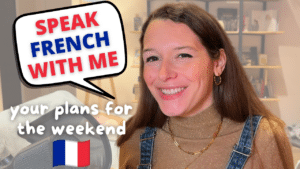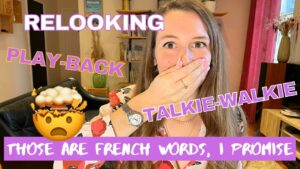Transcript of the video
Bonjour tout le monde, I hope you're well. Today I'm back with another French video, and I'm not alone. I'm here with my friend Adina from Romania. Before you start, don't forget to activate the French subtitles, as they'll help you understand everything in the video.
First of all, let's explain how Adina and I know each other. You've been living in France for a few years now, but we didn't meet in France.
So, when I was a student, I had to submit an end-of-year project, a video, and with my team, we had chosen as our theme to talk about agriculture, farmers in Europe and more specifically farmers in Romania. So we were going to film a report in Romania, but none of our team spoke Romanian. So we put in a word to the University of Bucharest to see if someone, a student, could come with us to do the translation. And only one person replied, and that was you. And you accompanied us for 10 days to do the interviews and translate all our video content.
So that's how we met. Now, maybe I'll let you introduce yourself.
Yes, well, my name is Adina, as I've already said. I'm 29 years old. I've been living in France for 3 years now, more precisely in the Lyon region, near Lyon. I've also been working in France for almost two and a half years.
Can you tell us why you came to France? Well, I didn't mention it at the beginning of the video, but the idea of this video is for Adina to explain how she managed to speak French so well, and also to tell us a bit about what might still be complicated for her, even though she speaks it very well, the expressions she's discovered in French recently, her favorite expressions, and to give us a bit of advice on how to improve our learning of French.
The pressure (laughter)
So can you also explain why you came to live in France?
So I'm going to take a look at my background before arriving in France. I didn't mention it earlier, but I did a semester of Erasmus, an exchange program to study in Brussels. So that's already a first step, because I studied in French. I took my exams in French. I lived with French speakers. So that was 5 years ago now. After that, I came back to France, to a French-speaking country, to Grenoble, for another year for my Master's degree.
And then I came to France to work and also to join my boyfriend. My boyfriend is French. We had to choose between France or Romania or another country to live together after a few years of long-distance relationship. So we chose France together. It was a decision. It seemed the best for our professional life, and for me too. So that's how I arrived in France, in Lyon, three years ago.
And now you're married, you've had a little one, a little baby for two and a half months. That's it!
You speak French very, very well. Can you also explain how you managed to reach this level in French?
I'd already started at school. You start quite early with the second foreign language at school. I was 12. The first language is English. And everyone says: you have to speak English. That's imperative and the second language isn't optional, but there's not as much pressure from teachers or in general from life, from the workplace, to speak a second language. But still, it was the language I liked best. And then, when I was 15,
I started taking lessons myself at the French Institute in Bucharest for 2 years when I was 15 and when I was 16. And it was much more useful because we did more conversation, more vocabulary and a little less grammar. And the second year, my teacher was French too. So I thought that was great.
For me, it helped a lot because French, a foreign language, whatever, from a foreigner spoken with an accent is not the same as a native speaker.
And then, of course, the most important thing I learned was when I came to Brussels for my Erasmus. Then to Grenoble, for a year's Masters. And now I've been living there for three years, because that's where you talk the most. Where you hear everything all the time. You're immersed in a language, you hear it in the supermarket, on the bus, on TV. So that's where your vocabulary really explodes, much more than it does at school.
What if you had some tips to give to people learning French?
I think we need to talk. I think you have to dare. Of course, we'll always have an accent, we'll always make mistakes. We'll always struggle to make ourselves really understood, to make ourselves understood, that's how we say it? The same goes for jokes. We'll have moments when we can't really say what we want. We'll struggle to find our words, but I think it's... you have to dare, you have to go for it.
You have to start learning to talk. And the more you talk, the more confidence you gain. You get more answers. So that's how you learn too, as you go along, I think that's what you have to do.
You can't be afraid to make mistakes. You have to go for it.
Yes, I think we have to accept that we're going to make mistakes anyway. Yes, it's no big deal.
Yes. Even when you are a French speaker, you make mistakes all the time too.
Yes, I think so, but I don't realize it.
Do you have any words or expressions that you particularly like in French, that you find pretty?
Yes, there are plenty, that's for sure, because I love French so much. So there are lots of words. Here like this... I really like "poignées d'amour", but I think you'll explain better than I what it means. And I really like it because it's similar to "pomme d'amour". So I like them both. And also because at first, I was confused so I like both. And my favorite word in French...
I think I pronounce it very badly, but I like it a lot when other people pronounce it, it's poppy, it's the flower. It's the red flowers you find in the fields, the wild flowers. And love handles, it's a part of the body, it's the part we have... I don't know if you can see it well, but here, at the bottom of the stomach, on the sides. And it's true that it's often presented as a defect.
It's an area where a little fat accumulates. And it's true that in French, it's pretty because we say "poignées d'amour". We make it sound a little... a little cute. We don't say it's a defect. We just give it a nice name. And love apples are what you get at fairs. It's an apple on a stick with sugar.
Are there any words or expressions you've learned recently?
I learned one. I think I'd heard it before, but it's fairly recent. It's "to make a tunnel" or "to be in a tunnel". I think that... I don't know if it's familiar, but in any case, that's how I perceive it. Other expressions, I think...
I'll explain while you think of other expressions. When you say that someone is tunneling or tunneling someone, it's actually when you're in a conversation. It's really a colloquial expression. When you're in a conversation with someone, but actually there's only one person talking, so it's like they're tunneling. You see, it's where you pass with the car and it lasts a long time. And you don't see any light. Well, it's kind of the same thing.
You're talking to someone, but in fact, only one of the two people is talking. She's actually making conversation, but you can't talk to yourself. So it can get a bit boring.
Yes, I heard an expression two days ago because it was cold. I think it means it's cold, it's freezing. It's "ça meule".
And yes, it's cold outside. Okay, I didn't even know that expression.
I don't know how often it's used, but it was the first time I'd heard it.
I think it's right. I didn't know it, but there are so many slang expressions. It's evolving so fast that... Well, you see, you're teaching me an expression.
What else do you find most difficult about the French language? If it's pronunciation, grammar, conjugation...
Verbs, conjugation... No, I didn't find it particularly difficult. I think it's making the difference between... well, turns of phrase. And that's especially since I've been working, because I find that in e-mails and in professional exchanges, I think it depends a lot on the environment too, of course. But the French pay a lot of attention to how things are said, to sentences. It has to be a bit... Well, for example, I tended to talk, to use smiley faces, to be a lot more colloquial. A language where you don't have to think so hard.
I find that in France, we use the conditional to impose things or we have to be polite. You really have to be careful. When I write an e-mail, I read it over and over again to tell myself it's not too aggressive, it doesn't sound too... I'm not imposing, I'm not being too... That's it, the nuances that you don't necessarily perceive. I think it's culture too, it's not just the language would be. I still have trouble with masculine/feminine sometimes.
Because, of course, there are words in my language, in Romanian, that are masculine and in French they have to be feminine. So I'm still having trouble with that, and I have the impression that there are no rules. You have to know whether it's masculine or feminine, that's just the way it is. And then, I think there are words that have a structure that gives you a clue. It's feminine. If it's an "ette", for example, I think it's more feminine. But otherwise, you have to know them.
It's not normal, it's hard.
Apart from masculine/feminine, are there any other recurring mistakes you make that you realize you've made? But each time, you're often wrong.
Yes, I still make a lot of them, but I think the most common is... I often say "I asked my mother" instead of "I asked my mother". Right. Or "I asked them" instead of "I asked them". So I'm still having trouble with that. What else... Numbers, apart from 70, 95... I can't do calculations in my head, if someone tells me a phone number, an address with lots of numbers, a train number, for example.
I can't do that. You always have to translate to do the math. But apparently, I don't know if it's true, but I'd heard that studies show that it's hard to get the brain to do calculations in another language. OK, I don't know if it's just me. But it comforts me to know that someone said that. But I'm still having trouble with that. And yes, the same with the masculine feminine, for example, I always say "une bain" instead of "un bain" and "baignoire" the same way I reverse it.
Yes, I still have trouble with a lot of words.
Yes, and what's more, like us, maybe we understand that people don't correct you either. They don't say be careful, it's the bathtub and not the bathtub, because people understand, so it doesn't matter.
Yes, I think they think "I'm not going to correct her". It also depends on the relationship.
Well yes, yes, yes, yes, moreover.
And are there any sounds that I find really difficult to pronounce in French? That must also depend on your mother tongue, which is Romanian. But are there any sounds that are complicated for you?
For me, I can't say the word "wine" any differently, like the drink and the "wind" that blows outside. And "vingt" also the number, so 19, 20. I can't say... For me, the three words, when I hear them... Sometimes I can tell when someone says them to me really one after the other, one after the other. I can say, "Ah yes, it doesn't sound the same."
Yeah, but it's true that it's difficult, "du vin" and "le vent" are very close. So it's true that it's true.
I can hear it, but I can't say it.
Yeah, I understand.
I can't seem to make the "re" like in French. I think you need to throw up a little.
Yes, when you have sounds that really don't exist in your language, it's really hard to reproduce them.
I think hearing them is quicker, but then you need a musical ear too, which I don't have. But to pronounce them, that's another level. It's more difficult.
Thank you so much Adina for sharing all these tips. And your French experience with us.
Thank you for the invitation...
With pleasure
And for the videos you make too.
Thank you and see you soon. And I also say to you very soon for a new video.
See you soon!








